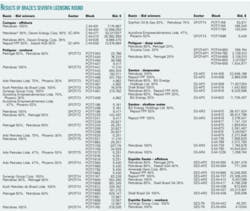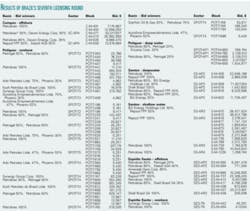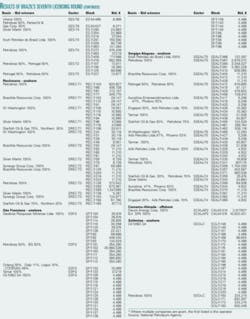Gas-focused Brazilian licensing round sets records
A record number of companies-144, compared with 42 last year-were qualified to participate in Brazil’s seventh oil and gas licensing round Oct. 17-19, which generated more than $529.6 million for Brazil and is being called the country’s most successful auction.
Brazil’s National Petroleum Agency (ANP) tendered a total of 1,134 blocks-509 onshore and 625 offshore-which are spread throughout 14 basins in regions likely to contain natural gas.
Of 450 blocks offered the first day, 140 mostly onshore blocks were acquired for the record total price of $244 million. Second-day bonuses surpassed the first, reaching a new record of $484.3 million for 253 blocks, compared with $220 million for 154 blocks in that round last year. Mature fields were tendered on the third day.
Success factors
Analysts credit several factors for the success of Round 7 participation and the large sum obtained compared with previous ANP rounds:
• High oil prices and the belief that it will remain high for an extensive period of time.
• The worldwide need for natural gas and the fact that this round was geared to gas-prone areas.
• The return of theories about the end of worldwide petroleum reserves. This has led companies to search for oil or gas in large, unexplored areas in countries such as Brazil, said Adriano Pires, a director of the Brazilian Infrastructure Center, who admitted that he was surprised at the “magnificent” results of the round.
Caio Carvalhal of Cambridge Energy Research Associates focused on another important point in this round: “the stability of regulations in Brazil compared with other crude oil producers in the region, particularly Bolivia, Venezuela, and Peru.”
State-owned Petroleo Brasileiro SA (Petrobras) forecasts that Brazil will become self-sufficient in oil by 2006. Brazil’s Mines and Energy Minister Silas Rondeau told reporters the auctions should help Brazil remain self-sufficient until 2015.
The minister praised ANP for focusing the auction on gas blocks to help diminish Brazil’s heavy dependence upon imported natural gas, especially from Bolivia and Argentina.
According to ANP Director John Forman, the tenders will help Brazil expand total proven oil reserves 4-5 times from the Dec. 31, 2004, level of 14.8 billion bbl.
The awards
ANP Director General Haroldo Lima emphasized that the seventh round was characterized by the diversity-in nationalities and size-of participating companies and the great interest shown for onshore areas. Local analysts noted that the large number of bids in onshore areas is interesting because some 80% of Brazil’s total crude oil output currently comes from the offshore Campos basin.
Lima estimated that the winning bidders in the first 2 days of the auction are committed to minimum expenditures of some $1.5 billion through 2011.
Petrobras dominated the auction’s first 2 days, disbursing $225.7 million to secure stakes or total interests in 96 blocks, 70 of which it will operate. Petrobras acquired 31 blocks on the first day.
Onshore awards
Some companies were participating for the first time in Brazil’s auction. In its first venture in the international arena, for example, Argentina’s Oil M&S SA won the license to 22 onshore blocks in the gas-prone São Francisco basin near Belo Horizonte, capital of Minas Gerais state. Natural gas emanating from a lake in the São Francisco basin frequently burns on the water’s surface.
In addition, Brazilian company Geobras Pesquisas Minerias Ltda. acquired a 100% interest in nine blocks in the same basin, where Petrobras has already drilled 17 wells and shot 1,396 km of 2D seismic survey.
Petrobras acquired six blocks in the same basin in a 50-50 partnership with BG Energy Holdings Ltd.
In addition, Petrobras won licenses in the Potiguar basin in northern Rio Grande do Norte state. The company acquired 100% interest in four onshore blocks and bid as a 50-50 partner on another four with Petroleos de Portugal SA (Petrogal), Lisbon.
Some newcomers to Brazilian auctions, such as Oil M&S and the Geobras Pesquisas, “ring-fenced” blocks awarded to giants Petrobras and BG in the São Francisco basin, Minas Gerais state. Oil M&S also won a block near Urucu in the Amazon rain forest, where Petrobras produces light oil and gas. The Argentine company took a total of 43 onshore blocks in the auction.
The recently founded Brazilian independent Silver Marlin acquired 10 blocks.
Flavio Barreto, exploration and production director of Sinergy Group Corp., said the seventh round “consolidated a niche market to be developed by independent oil and gas companies” in Brazil, which has no tradition of independent companies.
Offshore
A partnership between Petrobras (60%) and BG (40%) made the auction’s highest bid for a single block. The companies paid $71.8 million for Block S-M-508 in deep water in the offshore Santos basin. This is the largest amount paid for a block in all Brazil rounds. According to ANP, 28 wells have been drilled and 27,367 km of 2D seismic shot in the block’s vicinity. ANP considers the area a frontier.
The block is near BM-S-400, where Petrobras discovered 420 billion cu m of natural gas reserves in 2003, tripling the country’s reserves.
On the first day of bidding, Petrobras won deepwater Blocks C-M-401 and C-M-403 in the Campos basin at a cost of $19.7 million.
The company also took a 65% interest in Campos basin Block C-M-535 in partnership with Devon Energy Corp., which holds 35%. The two companies won 50% each in nearby Blocks C-M-471 and C-M-473, as well. Petrobras will operate all three blocks.
Petrobras won an 80% interest in three deepwater blocks in partnership with Petrogal, which holds 20%. Also in the deepwater Potiguar basin, two consortia involving Petrobras 60%, Petrogal 20%, and EnCana Corp. 20% won Blocks POT-M-663 and POT-M-760.
Repsol YPF SA returned to Brazilian bidding after not participating last year. In a partnership with Petrobras, Repsol YPF outbid Shell Brasil SA for a block in deepwater Espírito Santo basin and won another block in the same basin with Amerada Hess Corp.
Repsol YPF also acquired 8 of 13 blocks alone in shallow areas of the Santos basin and divided two other blocks with BG. In a 50-50 partnership, Repsol YPF and BG made the two other large offers, at $38.4 million and $36.9 million respectively, for Blocks S-M-615 and S-M-672 in the Santos basin. BG will be the operator.
Shell, whose priority was also the search for gas reserves, took a total of 15 exploration areas in Brazil, alone or in partnerships. Five blocks were in the Santos and Espírito Santo basins, three of them in partnership with Petrobras.
The company is the only foreign oil company with oil production in Brazil-40,000 b/d in Bijupira-Salema field in the Campos basin (OGJ Online, Apr. 9, 2003). Shell and BG also control Comgás in São Paulo, the largest gas distributor in Brazil, where the gas market is dominated by Petrobras.
A surprise on the second day of the auction was the return of Italy’s Eni SPA, which was a star bidder in the 1999 auction and then cut its expenditures. Eni disbursed $10 million to gain the license to an offshore block in Camamu-Almada, Bahia state.
Devon acquired another block in the Camamu-Almada basin near the coast of Brazil’s northeastern Bahia state for some $2 million.
Mature fields
No oil and gas companies submitted bids for the small mature fields offered on the third day of the round, which were gobbled up by small nonoil companies. Designers, university professors, transport companies, fuel distributors, and a telecommunications firm won licenses to 16 of the 17 mature fields offered in four different onshore basins in Bahia and Sergipe states.
Together, 14 winning companies paid $1.3 million for these licenses and committed themselves to invest a minimum of $27.7 million within the next 2 years. Of the 89 companies qualified, 54 participated.
The highest payment and commitment for exploration and production investments was by a consortium of the Brazilian companies Panergy Consultoria e Participações em negócios com energia Ltda. 30%, the operator, and ERG Negócios e Participações Ltda. 70%.
The companies, formed at the University of Salvador in Bahia state, paid $318,000 for the Morro de Barro gas field in southern Bahia and committed $6.1 million in field development investment.
Future rounds
Lima said the mines and energy ministry has approved another licensing round in 4-5 months. Previously, the tradition was to hold one round per year. ANP has 40 available mature areas to be auctioned.
This new round would be for mature or marginal fields only. Lima admitted that Petrobras doesn’t want to return part of its portfolio of mature areas to ANP. Exploration and Production Director Guilherme Estrella told OGJ that Petrobras is using new technologies to recover oil and gas in its mature fields.
However, ANP has appealed to the federal government, Petrobras’ main shareholder, to pressure the company to relinquish a share of these fields for the next auction.✦


